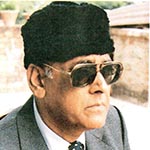In my heart I still believe your promises were true
The Verse
In my heart I still believe your promises were true,
And I wouldn’t care if they have fled your mind.
Now why do you sit and sulk so, my huzoor?
There is no cause for displeasure in our tale.
Are we mere companions or explorers of heavenly love?
Is this a night among friends or the heights of paradise?
And when she is absent, I am without
The presence of any other thing in the world.
Look upon the stars wandering deep into the night,
Our destiny is death and morning is near.
All you can know, Ishrat, is there exists
A poet, my youth, and the smile on your face.
The Ghazal
The heart believes your promises are true – let it be
No matter if you forget one or two – let it be
Now why do you sit there sulking so, my huzoor?
When there is no such vex from me to you – let it be
Are we mere companions or did we flow into streams
from the fountains of heaven, something new? – let it be
Circumstances change in her absence, the world is void
of any other thing to catch my view – let it be
Hey! You stars, wandering in the jungle of this night!
Death is your destination, the day is due – let it be
Ishrat, all you can know is that somewhere there exists
A poet, a smiling face, and my youth – so let it be!
August 1958
You and I have a special friendship
The Verse
You and I have a special friendship,
Call it a day, call it a lifetime!
My attempts to forget you
Are only an excuse to remember you.
Oh, sorrowful life, in this world
What value is there in my verses?
Dear broken-hearted, don’t sink
these boats down with your despair
You may elect for yourself,
For this is our love, this is our lifetime.
Misery is my companion on this path,
We only share this one lifetime.
These are webs, Ishrat, entrapped.
Untangle yourself from memory, be free.
The Ghazal
There’s a friendship between you and I now
What a time to be alive now!
Even my attempts to forget you
Only keep you in my mind now
In this time, this desolation
Do strange rhymes have value in life now?
Voyager, don’t bring your despair this way
These vessels might drown and die now.
Perhaps you should choose for yourself
This is love and life for you and I now
Destitute, we travel together,
Together, we cry for life now.
Memories harass you Ishrat;
Leave those nights, open your eyes now.
July 1966
With veiled eyes you enter my heart
The Verse
With veiled eyes you enter my heart,
Concealed now from the people of the world.
Indeed, we’ve had some tiffs in our love,
Yet I yearn for the one who abandoned me.
Oh, good tidings! With a signal from the sommelier,
Raise our goblets, raise them with the clouds.
I fear I’ll lose you somewhere among the flowers.
Upset, you camouflage yourself in the garden.
The wine graces me with such faith, such emotions, such sincerity!
Strange folk are those who revel in drink.
Don’t fall for her promises, oh distressed-heart, don’t do it!
She’s only grazing by you, forward, in transit.
Ishrat, they pretend with one face to protect our language,
And with the other, erase its script from our nation.
The Ghazal
In my heart, they unfurl, and I sing for them,
Lost to the world, I sing for them.
And even after the squabbles of our love,
For the ones I have hurt, I sing for them.
What a time! I return a nod to the sommelier,
Raising the cup, far up above, I sing for them
I fear you will be lost somewhere among the flowers,
In their gardens of disguise they don’t budge, I sing for them.
You worship the spirit with such faith, candour, spirit,
In revelry the drunkards overcome, I sing for them.
Don’t go trusting their promises! Oh, troubled heart, don’t go!
Those who leave and don’t return to us, I sing for them.
Those professing to be the guardians of Urdu, Ishrat,
From our nation, they subvert, I sing to them.
August 1970
Translator’s Note
The Indian poet Amrit Lal “Ishrat” was a respected scholar of history and literature in India during his lifetime. A collection of Ishrat’s most popular ghazals—written roughly in the period between 1955 – 1975—was published in both the Urdu and Devanagari scripts in the collection entitled ‘Yaadgar-E-Ishrat’ (“Memories of Ishrat”) in 1994. He was also my grandfather.
Ishrat’s speciality was the ‘sher-o-shayari’ format of Urdu poetry. Each ‘sher’ is a rhyming couplet that must strictly be kept within its predefined meters per line. A number of these couplets can be formed together to be made into longer poems, called ‘ghazals’, which usually continue the same rhyme and metric scheme throughout in exploration of a common theme.
The ghazal is a strict format, whose value and aesthetic quality depend almost entirely on its formal structure. The repetition of key words adds a rhythm to the recitation of the ghazal, and prepares the listeners—or readers—to focus not just on the word that is repeated, but the rhyming word that precedes it in the rhyming lines. It is through this language of repetition and cleverly-placed emphasis that the reciter or writer is able to reach his audience.
In translating Ishrat’s ghazal into English, I hoped to keep both the strict, repetitive format of the ghazal while not losing its essential meaning. I realized that, by focusing on one, I was sacrificing the other. The solution, I discovered, was a synthesis. Presented here are two versions of each of Ishrat’s most famous works, The Verse—a translation that attempts to stay closer to the meaning of the poem’s original Urdu; and The Ghazal—a structurally formal translation that modifies the poems to pay closer attention to the classical Ghazal format. In this way, I hope to transfer over the cultural aspects of Urdu even as the poems are read in English.

Karan Madhok is an Indian writer and a graduate of the MFA programme from the American University in Washington DC. His short fiction has been published online and sports journalism work has been frequently published for SLAM, Nation of Sport, NBA-India, and more. He won American University’s 2018 Myra Skralew Award for the best MFA Thesis (prose) and is currently working on his first novel. His poetry translations have also been published on The Literary Review.

Amrit Lal “Ishrat” Madhok (1930-1989) was an Indian poet, professor, and historian. He published nearly a dozen books on his lifetime, focusing on subjects of Iranian history, literary criticisms of well-known poets such as Ghalib, and the history of Urdu shayari in Varanasi and beyond. Outside of his academic work, he published several of ghazals in Indian literary journals, most prominent of which appeared in Bisawi Sadi. A collection of his most popular ghazals–written roughly in the period between 1955–1975– were published in both the Urdu and Devanagari scripts in the collection entitled Yaadgar-E-Ishrat (“Memories of Ishrat”) in 1994.

 BACK TO ISSUE
BACK TO ISSUE